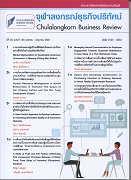Market Segmentation for Sustainable Conscious Consumers in Mueang Chiang Mai District
Main Article Content
Abstract
Abstract
The purposes of this study were to examine market segmentation for sustainable conscious consumers in Mueang Chiang Mai district and to investigate characteristics of each group of sustainable conscious consumers. Data were collected from 350 samples. The tool to collect data was questionnaires, composing of questions on sustainable conscious consumption in 3 dimensions: environmental consciousness, social consciousness, and economical consciousness. Data obtained were analyzed by factor analysis and cluster analysis to divide consumers into groups.
The results of the study and the analyses indicated that the assessment of sustainable conscious consumers in Mueang Chiang Mai district could be sorted out into 7 components: social consciousness, environment-friendly consciousness, debt-free consciousness, saving and worthwhile consciousness, long term financial planning consciousness, non-sharing consumption consciousness, and sufficiency consciousness. Consumers can be divided into 3 groups: Group 1 sustainable consciousness group (56%), Group 2 uncommitted group (17%) and Group 3 beginners group (27%). The consumers in these 3 groups were significantly different in demographic characteristics; i.e. age, marital status, number of children, education background, career, and average monthly income.
The group of consumers with sustainable consciousness (Group 1) was the group of those who intentionally took their consumption into full consideration of effects in all three dimensions without debt-free consciousness. For the uncommitted group (Group 2), the consumers took consumption without any consciousness on environment and society. However, they had slight awareness on their long term financial planning. Their sufficiently consumption was in the moderate level. For the group of the beginners (Group 3), they started to consume by considering the 3 dimension of effects into account especially social dimension and debt-free consumption. Nonetheless, they had no long-term financial plan and were not thoughtful of sufficiently consumption
Article Details
Opinions and discussions in papers published by the Creative Business and Sustainability Journal (CBSJ) are deemed as personal opinions and the responsibility of the writers. They are not the opinions or responsibility of the Chulalongkorn Business School of Chulalongkorn University.
Papers, content, information etc. appearing in the Journal are deemed to be the copyright property of the Chulalongkorn Business School of Chulalongkorn University. Anybody or any organization that wishes to publish any part of them or use them in any way must obtain written permission from the Chulalongkorn Business School, Chulalongkorn University.


